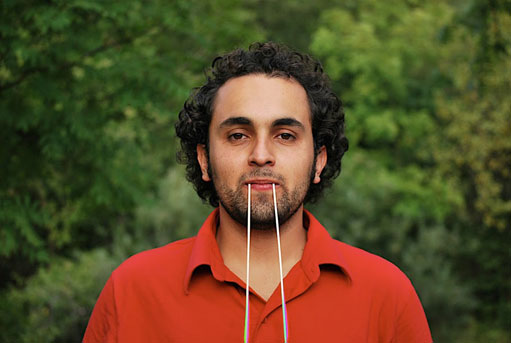
ATLAS e-News
23 February 2011
9 February 2010
Germán Carrillo
Nationality: Colombian

Germán Carrillo supposes those are chopstick tusks, but he doesn't recall exactly
It’s hardly a stretch of the imagination to think of ATLAS and CMS as siblings: competing, trying to get ahead, but ultimately friendly and supportive of each other. But for Germán Carrillo, the analogy moves over into the literal, because while he studies for a PhD on ATLAS, older brother Camillo is a six-year CMS devotee.
“In Spanish, we’d say that the situation has ‘spice’,” Germán laughs. “Sometimes in my group, my colleagues ask me ‘so, what’s the gossip from CMS, have you heard about this or that..?’” In the end though, it is easier to solicit information from his brothers’ friends than to do so direct from his brother, who is usually attempting the same in reverse. “Of course we try. Of course!”
Camillo had been at CERN for four years, on and off, by the time Germán arrived. Germán had visited his brother in Geneva once or twice in that time, but although they’re close, proximity to Camillo didn’t really influence his decision to come here himself: “People think that things are that way, but it’s not completely true. Indeed the relation with my brother is funny. I would say that we talk a lot but it’s not about the things that brothers talk about,” he considers, citing science and computing as high on their discussion agenda. “I don’t want to say it, but it’s a kind of a geek relationship!”
Although the younger by two years, it was Germán who first decided that he would pursue physics as a career. The pair studied the same subject at the same institute, Universidad Nacionale de Colombia, Bogotá, but Germán’s path diverged from his brother’s when he chose to spend a year in London learning English. He was just 19, with no English whatsoever, and he jumped in with both feet.
“I don’t know what made me do it, but it was one of the wisest decisions I have ever taken. I was kind of a spoiled child. I had no needs, I never had to worry about work.” In London, Germán worked in bars and restaurants, and refused to take any money from his parents. “At the beginning it was hard, but I think I learned a lot from that experience and the situation made me meet some great people.”
People are one of the main things he misses about home too. “Bogotá is a party city,” he says. “It’s Latin America, so you can assume that comes by default. It’s funny though because it’s the opposite situation to here. Here if the town is very small, there is no party. But in Colombia, it’s like the smaller the town, the more parties you will find.”
Food and weather aren’t far behind on the list of things worth missing, although some people may find it odd that it is possible to pine for weather which is steady, season-less 15°C all year round. Bogotá sits on a plateau, 2600 metres above sea-level but close to the equator, between two fingers of the Andes mountains, and its climate is dictated by its altitude.
“It’s actually great, because you decide how you want to spend your weekend. If you drive down the mountain and then for sure you’ll get nice weather. More than 30 degrees, every single day of the year. If you want to chill out and spend time on the mountain hiking around, you just go up and it’s five degrees. You can even go to the snow peaks.”
Germán has been making the most of France and Switzerland’s snowy peaks, spending last winter teaching himself to snowboard. And in summer 2009, he started to extend his boardsports repertoire, trying out surfing in the south of France. “It’s brilliant! But it’s much harder than snowboarding,” he says. “You have to stand there in the sea, wait for the correct wave to arrive, then catch it. You need good luck. And you need months to be able to learn properly to ride a wave.”
Months worth of patience will come in handy for Germán at ATLAS, since he’s currently involved in Higgs physics analysis with the Wisconsin group, for both the four lepton and the WW channels. Incidentally, this is completely different to what his brother does at CMS (exotics searches). Alongside this, he has been taking Data Quality and Run Control shifts in the Control Room, and has an eye on what he might do in the meanwhile as useful data rolls in.
“Measuring the cross section of a Z resonance, for example, is fundamental to a Higgs analysis,” he explains. “It’s not something that the Higgs people do every day, but it’s a part of the puzzle. So there are a lot of interesting things still around that I can start playing with.”
The future, after he completes his PhD with EPFL in 18 months’ time, is an open book for Germán right now. One thing he is certain of though: wanting to spend time travelling around his home continent. “It’s a shame that I can name more than ten countries I’ve been in Europe but in South America it’s basically just one,” he says. “Here, you start to realise that travel is great and it’s not so complicated as you imagine. I have no concrete plans yet, but it will definitely be in the back of my mind until I manage to do it.”

Ceri PerkinsATLAS e-News
|